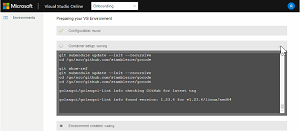News
Visual Studio Online Boosts Customization
Microsoft has provided more customization functionality and other enhancements to Visual Studio Online, which provides cloud-powered, managed, on-demand development environments accessible from anywhere via Visual Studio Code or a browser, with Visual Studio IDE support in private preview.
Visual Studio Online, some six years in the making, debuted last fall with the company touting cloud-powered capabilities such as scaling, predictable pay-for-what-you-use pricing and increased computing power, along with multiple tool choices, remote debugging, built-in collaboration and more.
"Additionally, Visual Studio Online brings many of the benefits of DevOps, like repeatability and reliability, which have typically been reserved for production workloads, to development environments," says the documentation. "However, Visual Studio Online is also personalizable to allow developers to leverage the tools, processes and configurations that they have come to love and rely on -- truly the best of both worlds!"
 [Click on image for larger, animated GIF view.] Environment creation leveraging a Dockerfile with new progress indicators, in action. (source: Microsoft).
[Click on image for larger, animated GIF view.] Environment creation leveraging a Dockerfile with new progress indicators, in action. (source: Microsoft).
Today (Feb. 27), the company detailed improvements that have been made to the project since then.
"We're excited to bring you several new features ranging from enhanced environment configuration with custom Dockerfile support to enabling setting changes to environments," said project program manager Allison Buchholtz-Au in a blog post.
She said that latter item, providing more environment customization functionality, grew from developer feedback. "Environments are as unique as the projects within them and we heard from many of you that our current customization options weren't enough. To give you greater control over your environment setup and improve repeatability, we've enabled support for Docker images and Dockerfiles and provided more insight into environment creation with our new progress screen. Additionally, you can also specify a GitHub pull request or branch URL, allowing you to jump directly into a pull request review or particular branch after the environment is created."
Other improvements include:
- Out-of-the-box support for more project types by expanding the default environment configuration to include PowerShell, Azure CLI, native debugging for Go and C++, updated .NET Core SDKs, and improved Python support.
- Functionality to mimic activating "turbo mode" via the tweaking of environment settings after creation in order to leverage more resources for intensive operations, for example. This can be done from VS Code or the portal.
- Easier cleanup of unneeded plans with deletion capability via the browser or VS Code, rather than having to log into the Azure portal.
- The ability to enable the use of the latest Visual Studio Code features directly from a browser. Developers can switch the Visual Studio Code Insiders channel to "on" in order to get early access to new enhancements.
Microsoft is seeking more developer feedback here.
About the Author
David Ramel is an editor and writer at Converge 360.